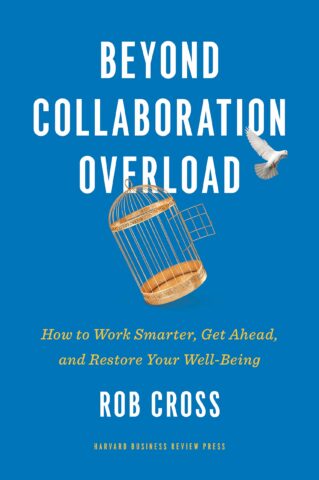Instill a calm, effective collaborative culture
Help your teammates rein in their tendency to collaborate, turn your meetings into an opportunity for close-knit and productive discussions, and organize fluid interactions. There are so many ways you can create calm, effective collaboration!

Beyond Collaboration Overload: How to Work Smarter, Get Ahead, and Restore Your Well-Being by Rob Cross, (Harvard Business Review Press, 2021).
1. Fight the spread of “acute collaborationitis”
Teach your team members, according to their individual profiles, to identify why they are accepting too many demands on their time. Only by doing so can you put a stop to the vicious circle:
- Do your most altruistic employees rush to meet every request for help? Make them aware that other people come to them because it’s the easy option. Emphasize that by refusing these requests, they are helping their coworkers develop their own resources.
- Are your experts trapped in the position of “knowing everything,” which then makes their teammates excessively dependent on them? Stop defining them by their expertise alone, and encourage them to develop other strings to their bow.
- Are your less-assured employees afraid of being seen to be second-rate if they turn down a request? Reassure them about their value, school them in how to be transparent about the pressures on them and their limits, and how to suggest alternatives.
- Do your perfectionist teammates want to be seen as beyond reproach? Take the pressure off them! Remember, it’s not against the law to admit you don’t know something (quite the contrary) and to ask questions to avoid unnecessary misunderstandings and work overload.
- Are your project managers afraid of losing control if they delegate? Encourage them to oversee their team rather than micro-managing, and stress the importance of delegating. Success is the result of a collective effort, not a personal exploit.
- Do your juniors employees always want to “be in the loop”? Teach them to take a step back and be selective about the projects they participate in. It’s counterproductive to plunge headlong into every opportunity that presents itself, especially when they bring nothing to the project!
2. Focus on the essentials
Don’t waste your time, or your employees’ time, dealing with irrelevant issues or performing additional tasks:
- Set your team’s priorities. Be very clear about your missions, the values that guide you and the areas you want to develop (and those that don’t fall under your responsibility).
- Set realistic, achievable targets. Goals that are too high (even utopian) and that focus on distant horizons are sources of collaborative overload, and will stress out your employees.
- Adopt precise rules to manage your team’s working time and digital interactions (email, social networks). Define the time slots for replying to emails and messages; sanctify weekends and holidays.
3. Prepare your meetings so they are really efficient
Put a halt to meetings that drag on and (im)mobilize too many participants! Before initiating a meeting, here are some things to think about:
- Be clear about what you want to accomplish and/or achieve during the meeting. Avoid convening meetings simply out of habit (such as a weekly review without specific objectives, which could be cancelled).
- Limit the number of participants to the strict minimum. Inform employees who are indirectly involved about the meeting (and its contents); reassure them that their presence isn’t necessary.
- Communicate the agenda, schedules, goals and list of other participants, and specify everyone’s role (moderator, facilitator, expert, decision-maker, etc.).
- Send preparatory materials to read ahead of the meeting so you can save time.
4. Run your meetings in line with best practices
By enforcing a few simple rules, you’ll make life easier for everyone:
- When holding videoconferences, encourage participants to arrive five minutes earlier than the scheduled time so they can chat informally before starting.
- Follow the agenda and the objectives; respect timetables.
- Tell participants that they have to be fully present (not answering their emails, texts, etc.). During videoconferences, ask everyone to keep their cameras on, even when sharing screens, to make it easier to follow nonverbal cues.
- Place a high value on concise contributions. If participants agree with what has already been said, encourage them … not to contribute.
- Establish clear and simple standards for handling disagreements – for example, on a videoconference, express objections verbally rather than writing them in the sidebar.
- Don’t save important information until the end.
- Do a quick wrap-up: Send a follow-up email that summarizes decisions, commitments made and next steps.
5. Re-establish relaxed interactions
When you speak with your employees:
- Listen carefully. If your contacts feel you are elsewhere, the discussion won’t be satisfactory; it will drag on and you will have to take it up again later.
- Allow all points of view to be expressed. Silencing disagreements may seem effective in the short term, but in the long run it means that buried conflicts will hamper collaborative dynamics.
- Use humor to lighten the atmosphere and erase any “political” tensions, ego disputes or differences in status that complicate collaborative work unnecessarily.
- Put disagreements into perspective so you can concentrate on common missions and the collective interest.
- Etablissez des normes de désaccords claires et simples – par exemple, en visio : émettre les objections de vive voix, au lieu de les inscrire dans la barre de menu.
- Ne gardez pas les informations importantes pour la fin.
- Faites une rapide synthèse : envoyez un mail de suivi qui résume les décisions, les engagements pris et les prochaines étapes.
© Copyright Business Digest - All rights reserved


